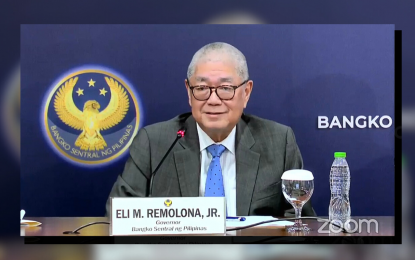
POLICY RATES. Bangko Sentral ng Pilipinas Governor Eli Remolona Jr. said there is unlikely ease in policy rates in the first half of 2024. He said the BSP remains watchful on what other central banks have been doing in terms of monetary policy. (PNA file photo)
TAGAYTAY – The Bangko Sentral ng Pilipinas (BSP) will not ease policy rates in the first half of the year despite the downward trend of headline inflation.
At a media information session on Saturday, BSP Governor Eli Remolona Jr. said that while inflation is already on a downward trend, the supply shocks still persist.
"It depends on the data, as we always say, but it's looking good. We like the trend so far. I would say, it's possible but maybe not likely," Remolona Jr. said when asked whether the BSP will ease policy rates in the first semester of 2024.
During its last meeting, the Monetary Board of the BSP kept policy rates unchanged at 6.5 percent.
"With regard to monetary policy, as you know, we’ve been watching what the other central banks have been doing, especially what the Fed has been doing," said Remolona.
Headline inflation further eased to 3.9 percent in December last year. It was a marked improvement from the 8.7 percent recorded in January 2023.
Based on BSP's baseline forecast, Remolona said headline inflation may still settle at the higher end of the central bank's 2 to 4 percent target this year.
"Our baseline forecast for inflation in 2024 is around 4 or 4.2 [percent]. [It's] not quite within range but close to being within target. But supply shocks may derail that forecast, including what’s going on with rice, the imports of rice. El Niño is a factor. So it depends on those risks," he explained.
The Philippine Atmospheric, Geophysical and Astronomical Services Administration warned last year that the El Niño phenomenon would last until the second quarter of 2024.
"We began to realize that supply shocks are very important for the inflation outlook, not because of the shocks themselves, we expect them to dissipate, but because of the second-round effects from those shocks," said Remolona.
"They affect expectations and those expectations affect second round effects, which we see in prices of services, for example, in wages, transport fares. So, we’re not out of the woods. We don’t see a smoking gun. Choose your metaphor," he added. (PNA)
